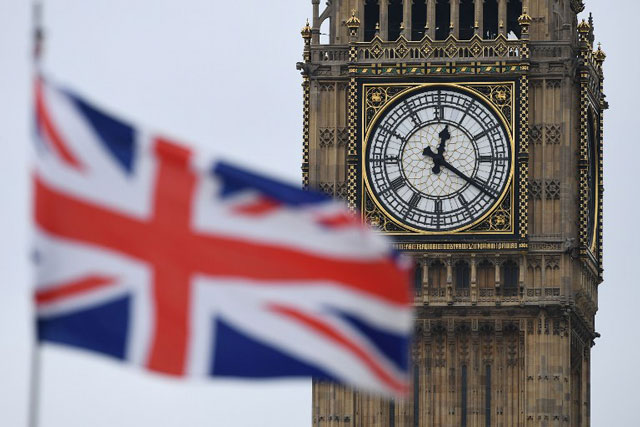
London, UK | Xinhua | While prices in Britain already rose at a pace never seen for decades this winter, a flare-up of the Russia-Ukraine conflict is expected to push the inflation even higher, with millions of households feeling the pinch.
Many have slashed the forecasts for the country’s economic growth amid surging costs and supply disruptions facing various industries. Slowing growth would put the central bank, the Bank of England (BoE), in an uncomfortable position of raising rates, analysts have said.
FROM ENERGY TO EVERYTHING
The economic fallout of Russia-Ukraine conflict could quickly ripple. “This crisis will impact almost all businesses and consumers directly via higher energy costs,” said Tom Pugh, an economist at business advisory firm RSM UK.
First came oil. Brent crude, a global benchmark, touched 139 U.S. dollars per barrel earlier this month, hitting a near 14-year high. These days, it still stayed high above 100 dollars.
The price surges, which feeds through into inflation with a lag of only a couple of weeks, will ensure that inflation peaks above 8 percent in April, Pugh added.
In Britain, the impact was visible on streets. Fuel prices hit a new all-time high in the end of February, British automotive services company RAC said, noting that it now costs 83.14 pounds (108 dollars) to fill a 55-liter family car, 3 pounds (3.9 dollars) more than the start of the year and 15 pounds (19.5 dollars) more than a year ago.
Natural gas went hand in hand with oil. When it skyrocketed to record highs due to the Russia-Ukraine escalation, the energy price cap in Britain was anticipated to follow it higher. In April, the cap will jump from the current 1,277 pounds (1,663 dollars) to 1,971 pounds (2,567 dollars) per year for about 22 million customers, with gas accounting for at least 500 pounds (716 dollars) of that increase, according to the British Chambers of Commerce (BCC).
Energy bills in Britain are “likely to rise sharply throughout this year as a direct result of the conflict in Ukraine and the sanctions imposed on Russian exports,” the BCC added.
Some analysts weighed the possibility of about 3,000 pounds (3,908 dollars), driven by global gas prices, when the cap is set to be changed next time in October.
In addition, price fluctuations of commodities have jumped to a high level, and there would be a knock-on effect. Over the next six to 12 months, “the surge in the prices of agricultural commodities and many base metals will feed through into higher prices for everything — from bread to washing machines,” Pugh said.
Retail prices rose in February at their fastest rate in over a decade and food inflation remained the key driver behind higher prices, according to the British Retail Consortium, a trade association representing the country’s retailers.
Even before the crisis, 4 percent to 5 percent in food inflation was forecast by mid-2022, said Ronald Kers, chief executive officer (CEO) of British food company 2 Sisters Food Group. “But we now could see a hyper-inflationary environment at closer to 10 to 15 percent — more than it’s been for 50 years — if this conflict isn’t resolved quickly.”
SLOWING ECONOMIC GROWTH
The continuing crisis represents a heightened uncertainty around Britain’s economic outlook, “with the only certainty being that it has deteriorated markedly,” said the Resolution Foundation, a think tank. The conflict is likely to weaken the economic growth, and “increase the probability of a recession.”
With energy prices climbing, Pugh said that “the status quo implies a one percent drag on growth,” and thus his team have reduced their 2022 growth forecast from 4.5 percent to 3.5 percent.
“The chances of a recession later this year or early next dramatically increase” if the conflict widens and oil prices move towards 150 dollars, he added.
Official statistics showed that Britain’s economy bounced back in January from the Omicron hit and is now above pre-pandemic level. However, British industries’ optimism is wavering under the Russia-Ukraine conflict.
It “is likely to exacerbate the current challenges around the cost and procurement of building materials, with oil, steel, aluminium, timber, and copper set to be some of the worst affected materials,” said Brian Berry, CEO of the Federation of Master Builders, a British trade association.
Retailers also fared badly. “As is the case for consumers, retailers also face tough inflationary pressures and will have to make challenging decisions around how to absorb those, or pass them on without losing custom,” said Paul Martin, UK head of retail in KPMG, a professional provider of tax, audit and advisory services.
The already bad situation is getting worse for many British households. Consumer confidence dipped by 2.4 points in February, according to British market research firm YouGov.
“Against a backdrop of accelerating inflation and the upcoming increase in the energy price cap, households are understandably nervous about the outlook for their personal finances,” said Kay Neufeld, head of forecasting and thought leadership at the Center for Economics and Business Research.
If average energy bills rise to 3,000 pounds (3,908 dollars) per year, this could leave 8.5 million households in fuel poverty denied a warm safe home, said Adam Scorer, CEO of Britain’s National Energy Action, a national fuel poverty charity. “This is a disaster and inevitably, will lead to more needless winter deaths.”
MORE RATE HIKES
High inflation, far above the 2-percent target of the BoE, has prompted the central bank to raise the interest rate twice in December and February, the first back-to-back hikes since 2004. But they were considered not helpful, experts have said.
“Energy prices are set on a global or at least continental basis, so raising UK interest rates will do nothing to reduce energy prices and help calm inflation,” Pugh said, adding that energy prices tend to be extremely volatile, and if the Monetary Policy Committee (MPC) of the BoE responded to every move in global energy of foreign exchange markets, “it would be changing monetary policy every day.”
Moreover, the forecast for slower recovery has complicated the situation. “Raising interest rates and taxes at this time would weaken the UK’s growth prospects further, by undermining confidence and diminishing households’ and firms’ finances,” said Suren Thiru, head of economics at the BCC.
Nevertheless, the interest rate was widely expected to rise from the current 0.5 percent to 0.75 percent at the conclusion of the next MPC meeting on Thursday, with more, but not so many as the market had formerly anticipated, hikes on the way.
Noting that his team expected a rate hike this week, most likely 25 basis points, James Smith, a developed markets economist at the Dutch financial services corporation ING Group, said that once the rate hits 1 percent, probably in May, policymakers will put increased emphasis on the deteriorating growth outlook.
“That suggests markets, which are pricing six further rate rises this year, are overestimating the pace of tightening,” Smith added.
Samuel Tombs, chief British economist at the consultancy Pantheon Macroeconomics, said his team sees little chance of the MPC raising the rate by 50 basis points (bps) at one of its upcoming meetings.
“We continue to expect the MPC to hike Bank Rate by 25 bps in March and May, and then to pause in the second half of the year,” Tombs said.
*****
Xinhua
 The Independent Uganda: You get the Truth we Pay the Price
The Independent Uganda: You get the Truth we Pay the Price


